The Radio program of Hyderabad Literary Festival 2020
The three days in the radio of the festival were full of surprises on so many dimensions. We tried to think of formats beforehand, we tried to be prepared in a modular way — any situation which arises, to give it an immediate shape.
The multitude of topics in the festival were reaching the radio pretty fast. Every year, Hyderabad Literary festival has a celebrated language. This year the language was Malayalam, spoken in the Indian state of Kerala and the union territories of Lakshadweep and Puducherry. During our times with the students, we were taught that Malayalam is one of those as difficult as beautiful Indian languages so we did not know much. One of the Malayalam speaking invitees was Benyamin novelist and short story writer from south Indian state of Kerala.
A talk with the Malayalam novelist Benyamin right after his panel in the festival
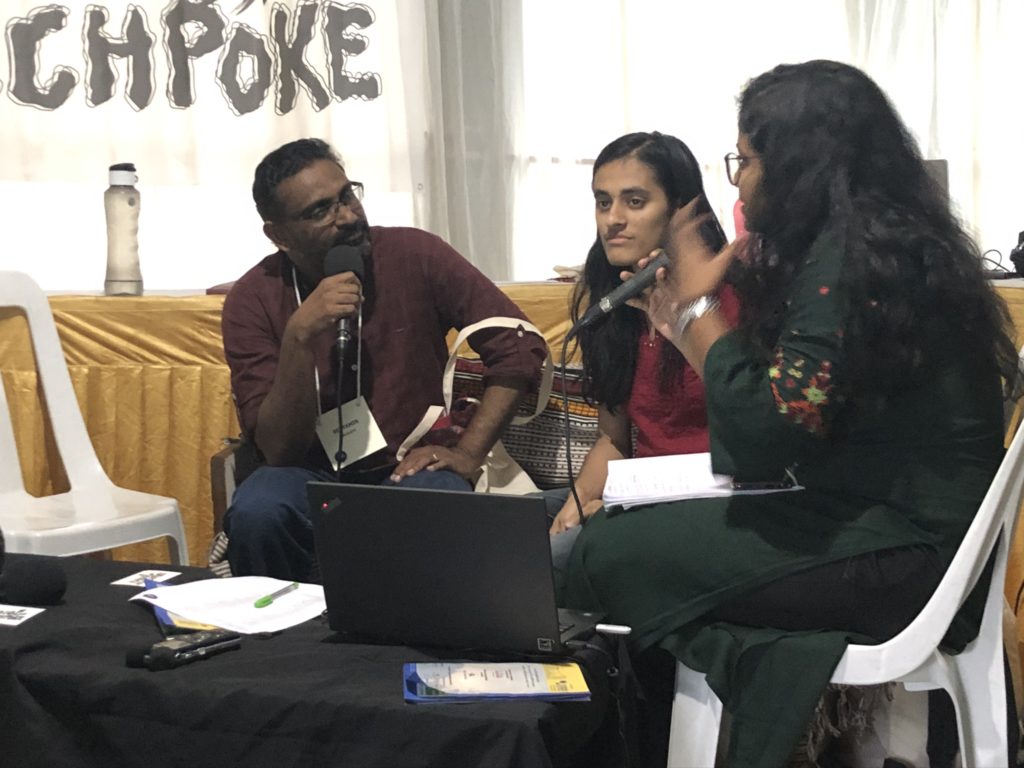
We played games in Malayalam. Even some of us who heard it before had difficulties not turning the moment into a comic one. There were moments of microphone passing when people literally ran away.
Game in Malayalam
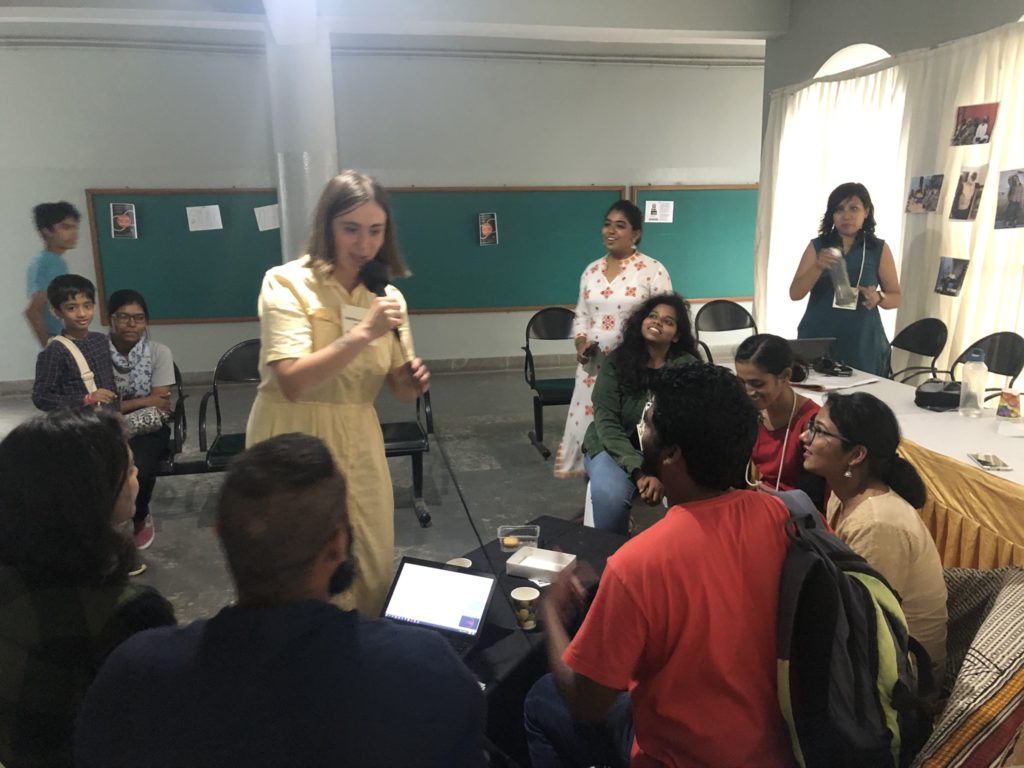
A musician passing by responded to his own tools.
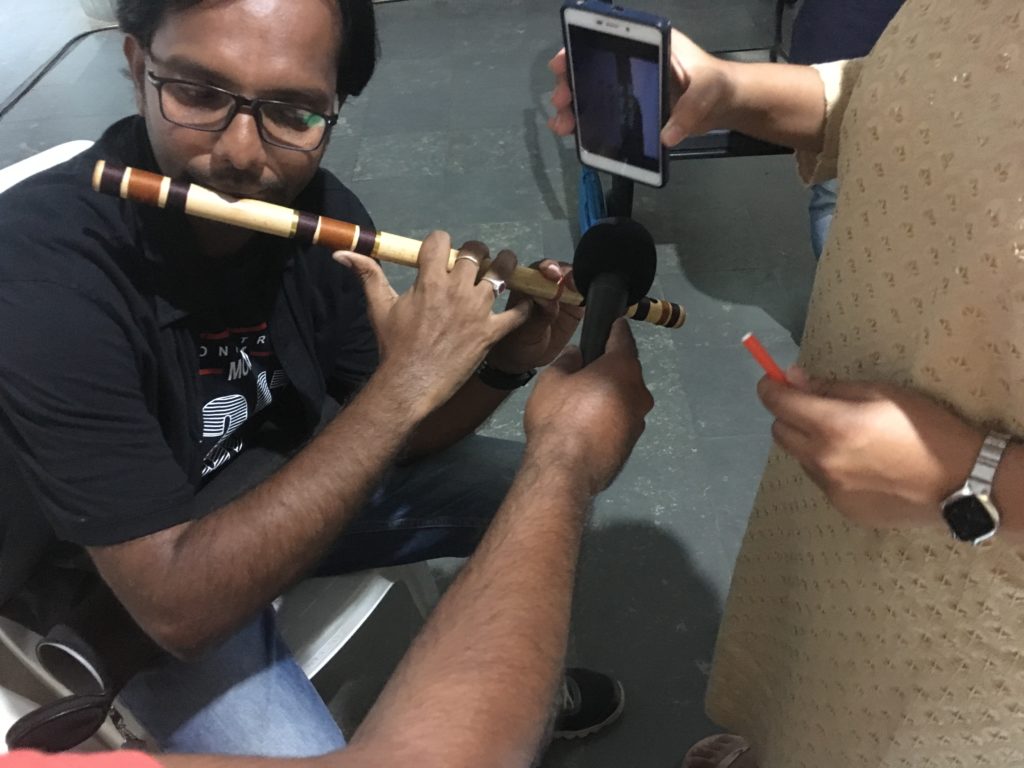
Responding to the language game with instruments.
Every year, Hyderabad Literary Festival invites a nation which means that there is a majority of writers and thinkers from a specific territory that join the dialogues created inside of the festival. This year the nation was Australia and special attention was given to Aboriginal Australian peoples writings. In this framework we had the pleasure to hear the poetry of Alfred Taylor. Alf is a member of the Stolen Generation and Australia’s leading senior Nyoongar writer. He gifted us his volume Long Time Now and made us laugh out loud at the wonders of his magnificent writings.
In conversation with the poet Alfred Taylor with Kieran Dolin
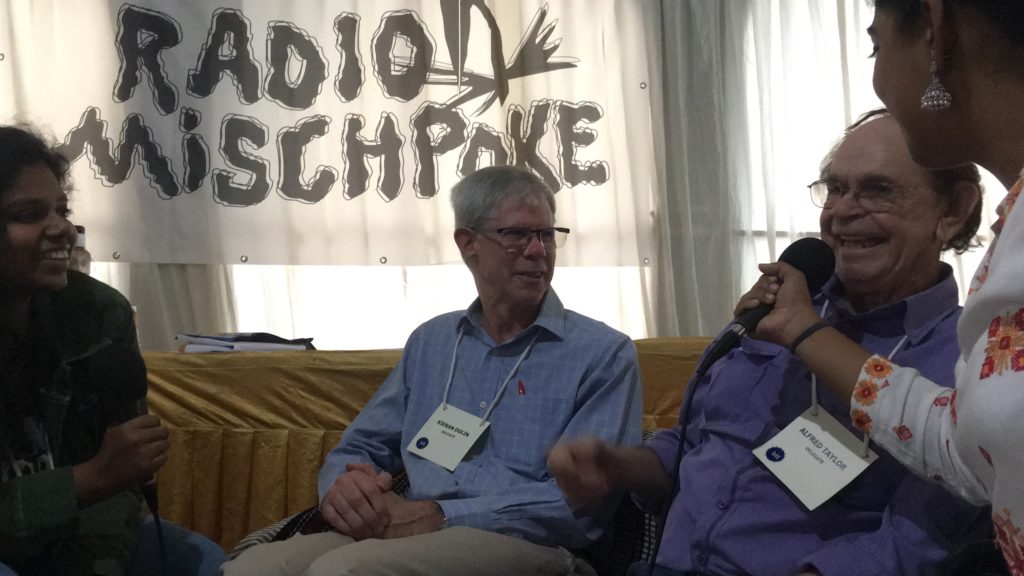
Our ambition was to bring diverse voices from the Telangana region to the festival. Voices of people that would not make it to the festival, of whose content is literature to us and yet their representation in cultural environments is often overlooked.
What can be literature in villages? Parveda Chandra Kiran and Vaishalee Das.
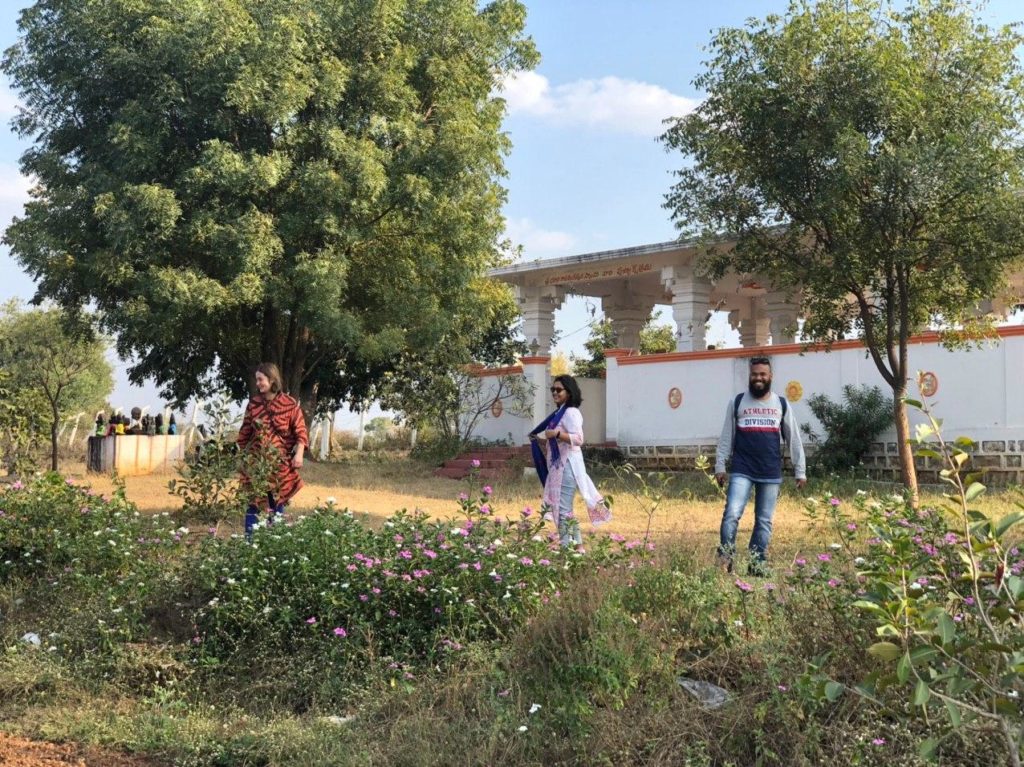
What was unique and extremely interesting about the radio is that people approached us to speak their mind. In the case of something we consciously saved time for was the Girls Talk how we called it within the team. With or without our planning, the Girl Talk happened spontaneously, expanded it’s genders, grew in importance and topics and for sure exceeded the regular radio limits. The first day: Menstrual hygiene and education strategies.
Girls Talk — Menstrual hygiene
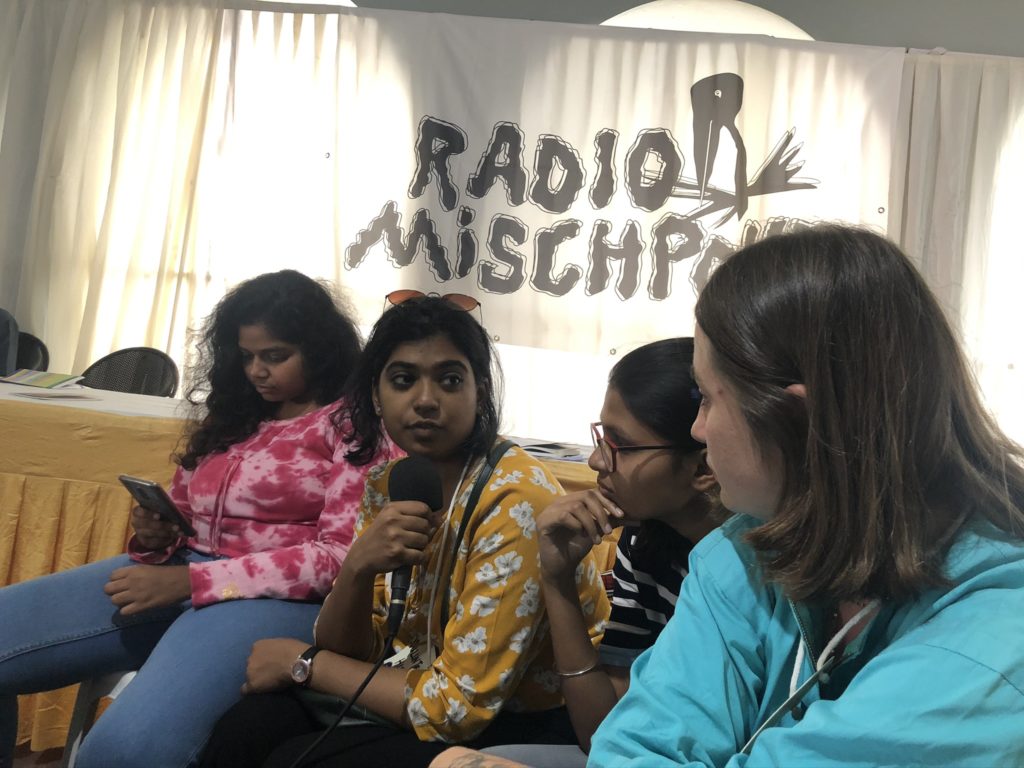
In the entrance to the festival, numerous creative expression forms that could easily happen in the radio as well, happened on a stage with a microphone and speakers where any time one would pass by, another surprising performance would happen on the scale from slam poetry to dance and music, comedy and drama. One of the engines for this happening not only for the festival but on a daily basis, is The Nation’s Rock Beat from Hyderabad who is daily working to empower and encourage young people to follow their desired forms of expression.
Girls from The Nation’s Rock Beat
On the second day, the girls talk was an experiment. We thought about how it would be to open the conversation and broad to a controversial theme such as wellness. It resulted in a broad, diverse, theoretical, post colonial, feminsit oriented discussion denouncing various body related prejudices.
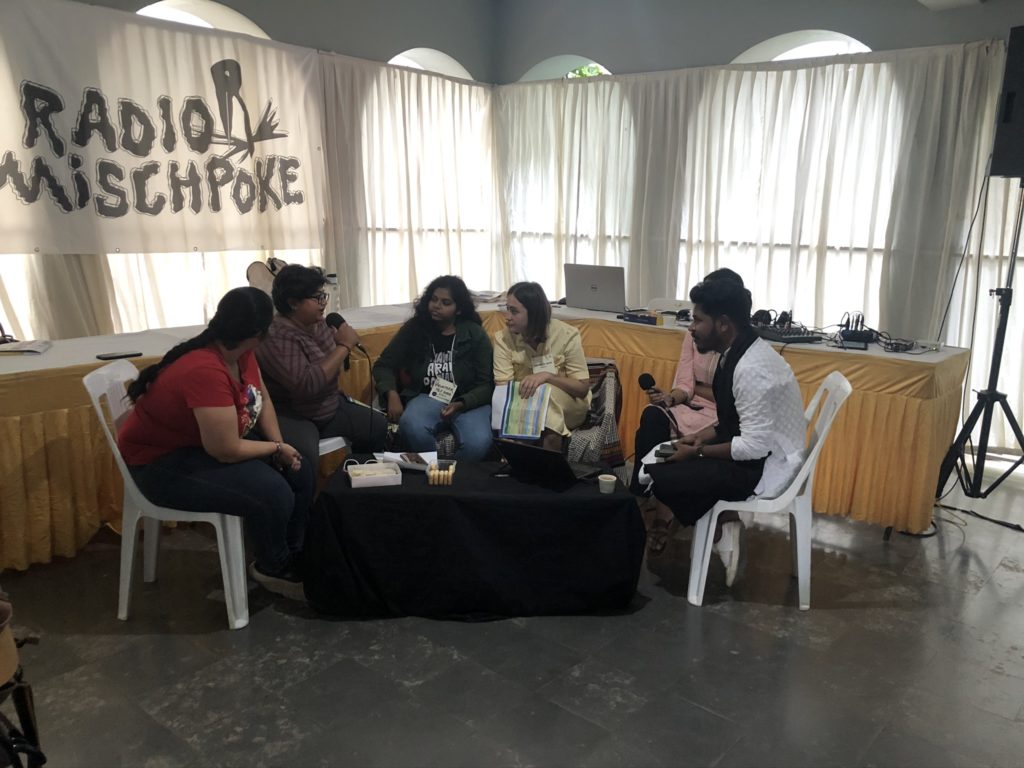
Girls talk against Wellness
The ease in Paromita Vohra’s speech was an afternoon treat to the listeners gathered around her. Paromita usually explores feminism, love and desire, urban life, and popular culture. She is the founder and Creative Director of Agents of Ishq, India’s best-loved website about sex, love and desire. Paromita gave her two cents and wisdom on love and dating, love and accommodating in ourselves diverse feelings.
Paromita Vohra “different people feel different things”
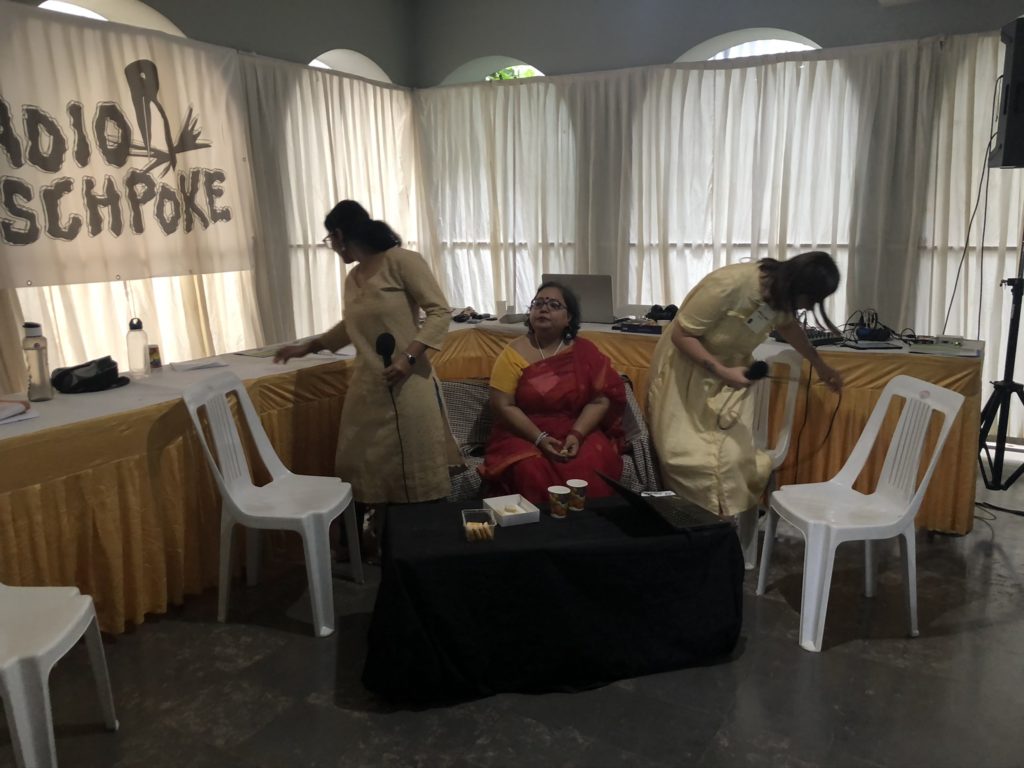
Their appearance — spectacular. Their speech — sharp and precise. Another insightful dialogue we had with Expressionist Dancer, Performance Artist, and a Tranimal Drag performer Patruni Chidananda Sastry. Binaries have been put aside.
Patruni Chidananda Sastry about the basics of Drag in Indian tradition
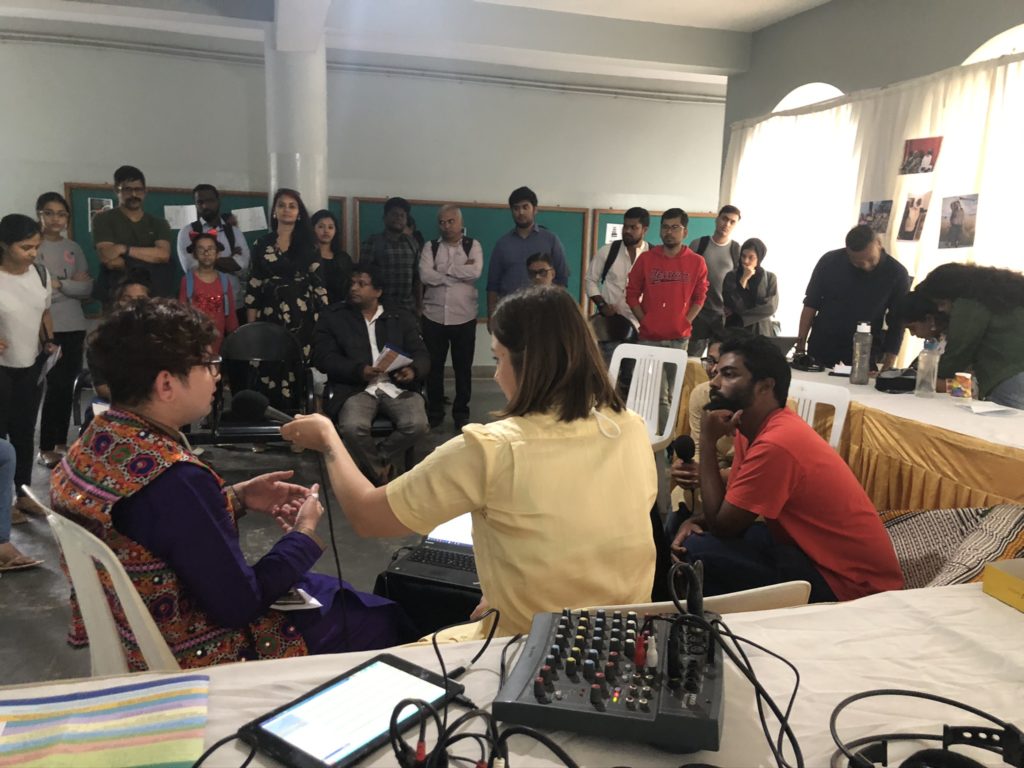
Prejudices on beauty and pleasure. Students went around the festival and asked people what they think about when they think about pleasure. The very surprising and closed up responses determined the team to go on by asking: what do you think about when you think about sexual pleasure. This triggered another freeing afternoon delight when the Girls talk turned into everybody’s talk.
Girls talk — Beauty and Pleasure
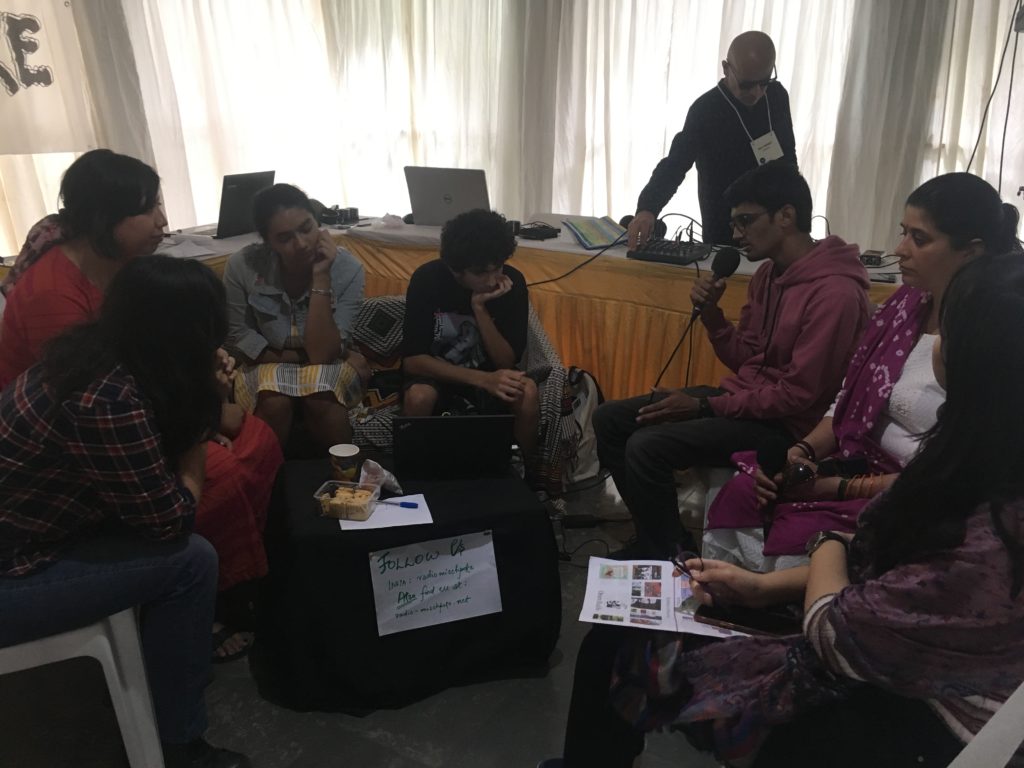
Saba Dewan, the author who writes extensively on the art and lifestyle of the tawaifs or courtesans, gave our team together to her surprise to our team’s question: what is sexual pleasure to you, her opinion on how to exceed the tabu of talking about pleasure
Saba Dewan about sexual pleasure
Jai Undurti & Fabian Stoltz talking about pleasure
The authors Jai Undurti & Fabian Stoltz, just after launching their book Inventing the City get dragged into our discussion on pleasure. Dragging it also into drawing.
The festival was situated in the building and courtyard of the historical building of the Vidyaranya High School of Hyderabad. Usually a home for knowledge dedicated to young adults and children, the place kept it’s character throughout the festival. It was even easy for the pupils to attend the festival with no impediment from their parents.
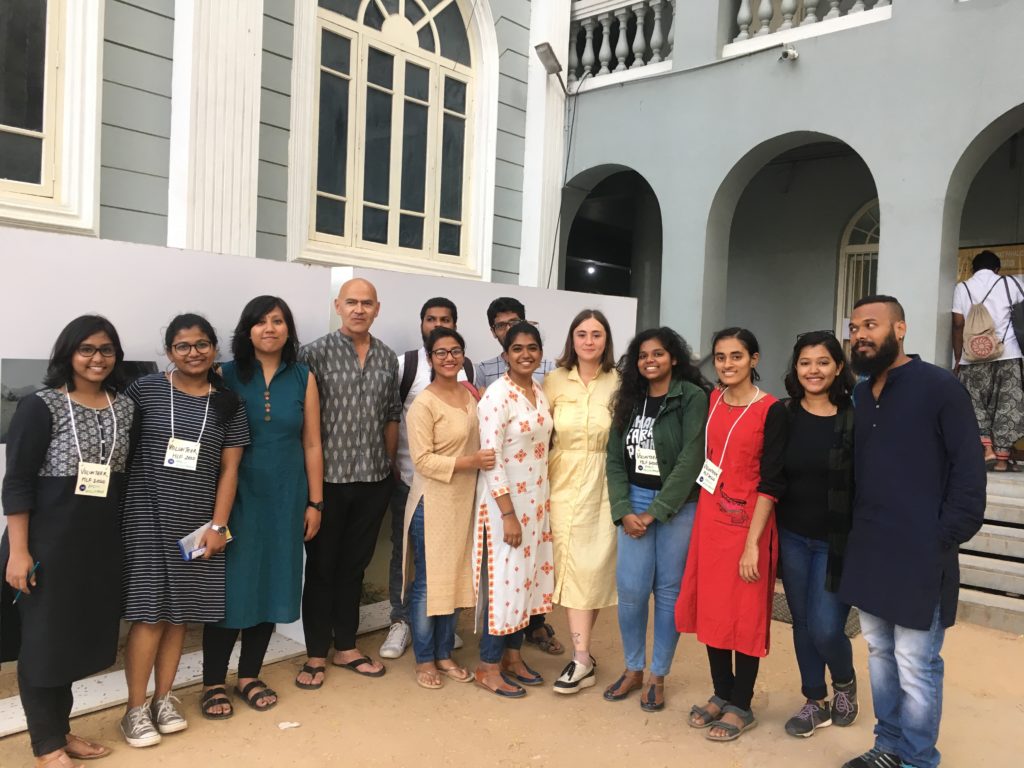
Students of the Vidyaranya High School visit the radio for the last minutes of the first day of the Festival
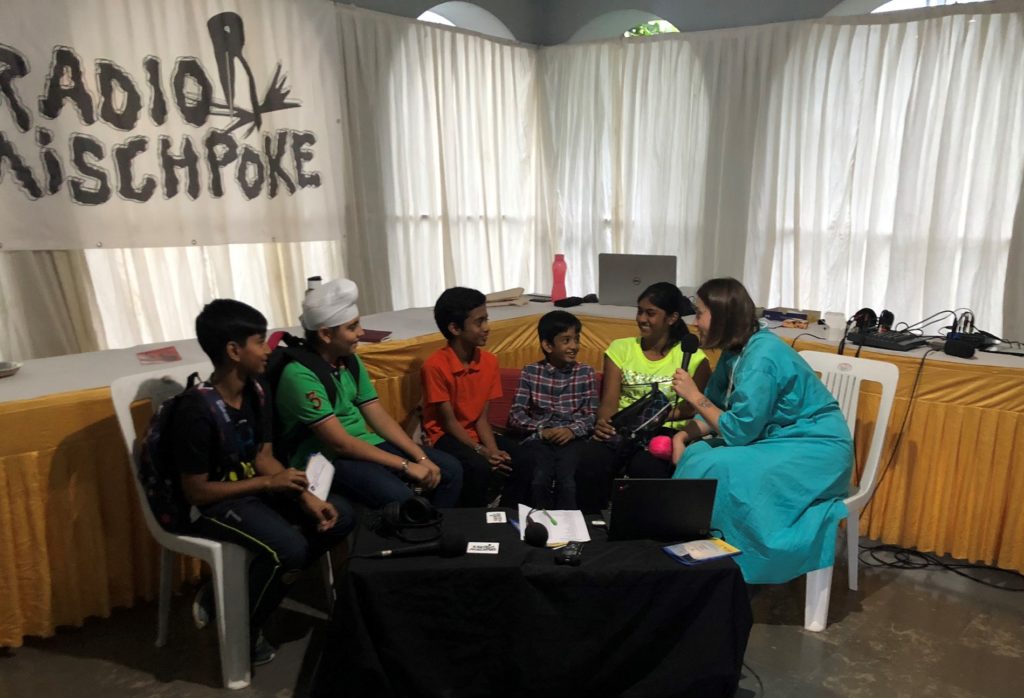
We broadcasted over several community radios in Europe, but most importantly over Bol Hyderabad on the campus of the University. We were visited by a regular radio maker of Bol who was on the other side of the radio for a moment, being the one questioned.
In conversation with DJ Bala, Bol Hyderabad
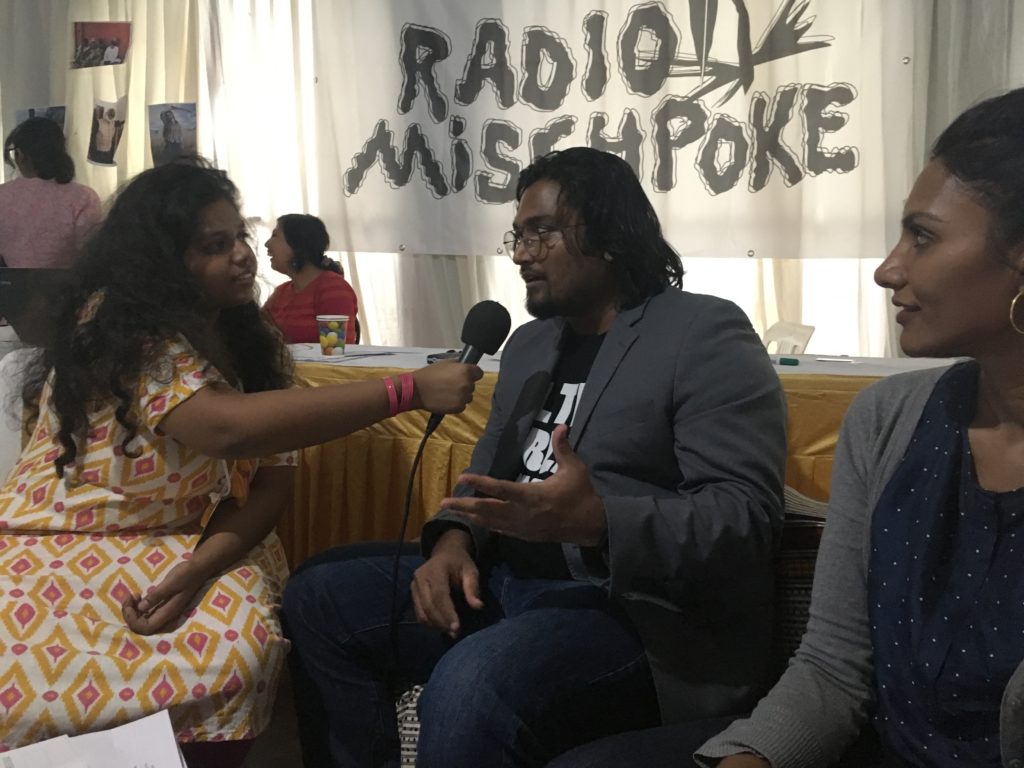
Maha Venkatesh and Praveena Paruchuri address their talk to European listeners on the difficulties and beauty their films involve. They are experimenting in film making and reached National Prize level.
In conversation with Maha Venkatesh and Praveena Paruchuri
We prepared special insects sound for when Khyrunnisa A., the prize-winning author of children’s fiction came by our little couch. She created the popular comic character Butterfingers for the children’s magazine, but also a ‘The Lizard of Oz and Other Stories’ which looks at the world from animals’ perspective. She also read from ‘Tongue In Cheek, The Funny Side of Life’, zooming in to the little drama of everyday life of women in India.
Khyrunnisa A. shares her writing and her approach of characters
In the festival one could attend workshops as well. That attracted a lot of people and enhanced various forms of creativity. We had the chance to chat with the lovely and humorous Kala Ramesh who writes and teaches haiku, tanka, haibun and renku people of all ages.
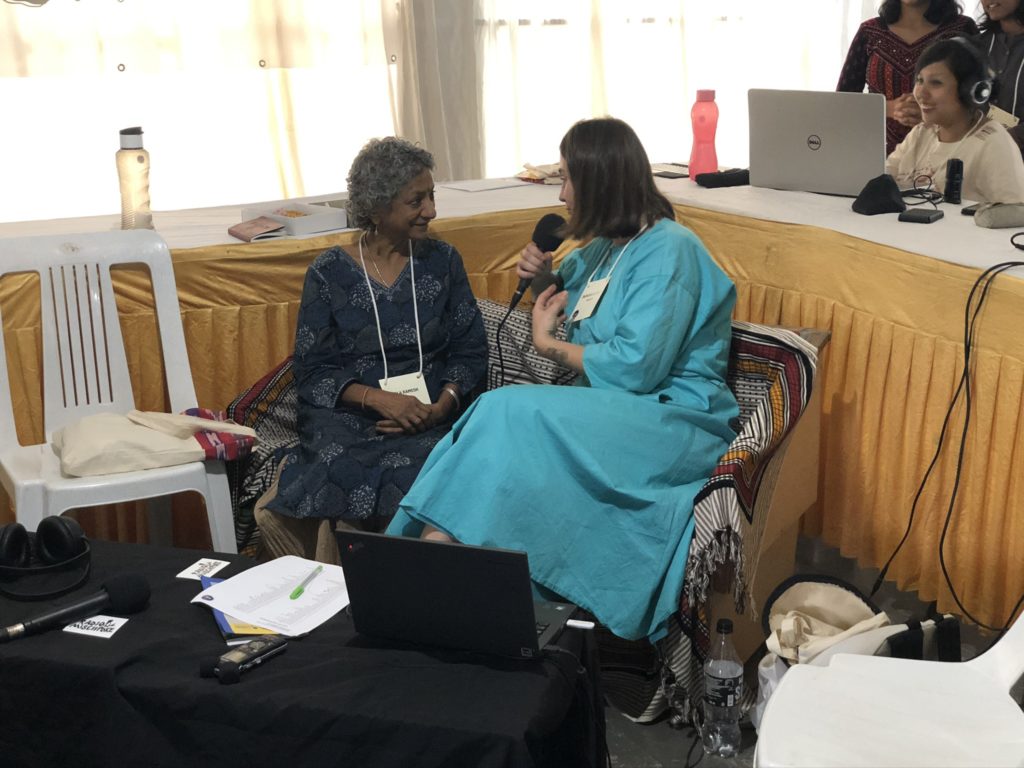
A few questions about Haiku with Kala Ramesh
What else is literature? We conveyed that it could be story-telling. Storytelling is something else all over the world. In HLF it had many many faces. Rachna Chowla uses storytelling as one of therapies with her clients and believes any story is an extraordinary story on an ordinary day.
Rachna Chowla talks about stories, tales, fables
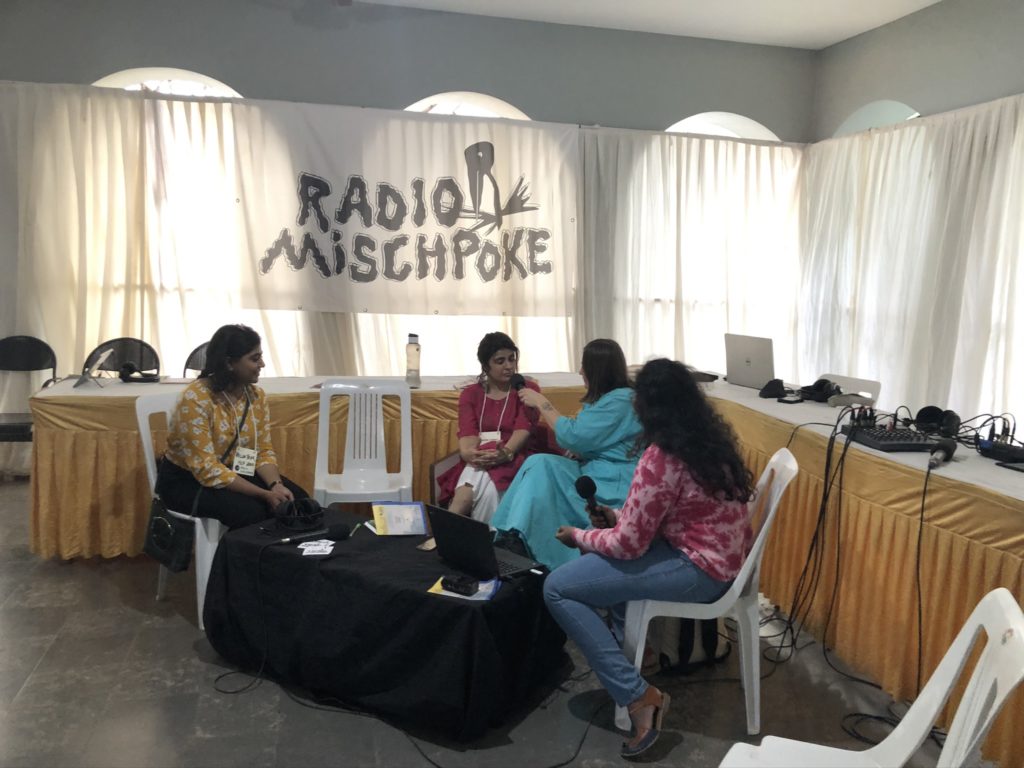
Story tellers on air. Giving their best for all kinds of listeners.
Story teller Saad Muhammed
Later after hearing about the Tale tellers group, we had the pleasure to get a heart-moving story from them. Probably told the second time the same day.
Tale tellers group
Where else is literature? Ms Shefali Rao, the Co-Founder of Food4Thought Foundation visited us for an account on spreading smartly and efficiently libraries and beyond — shortly facilitating wide access to various knowledge.
Shefali Rao, the Co-Founder of Food4Thought
In a mobile radio situation anywhere, but especially in a literary festival, the attraction for people to speak and share their thoughts and ideas is inevitable and also encapsulates the whole starting engine to a community feeling. Satish Mandalaparthy, aka Crimson worked with All India Radio & Red FM as an RJ & Programming producer. He shared some of his ideas on what is the place of radio in his life and beyond.
Satish Mandalaparthy about radio
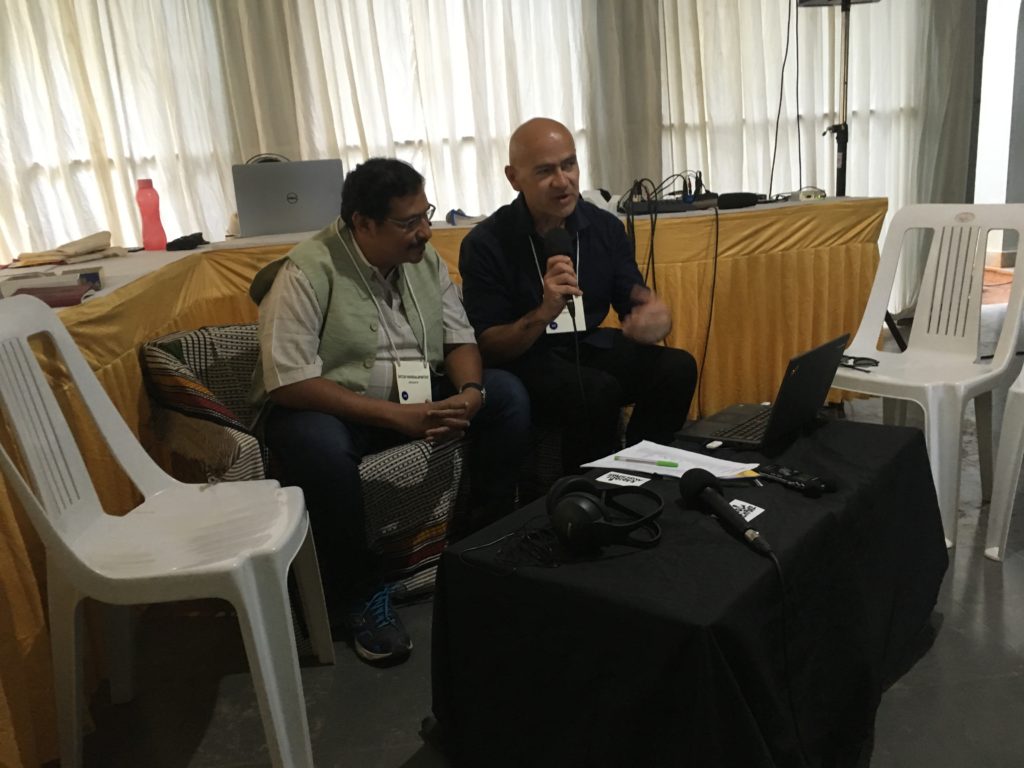
Near the end of our last day, we got to talk about the future. The future of HLF, in the midst of celebrating 10 years anniversary with one of the directors of the festival Vidjay Kumar.
Future with Vidjay Kumar
In the middle of so much literature, we had the pleasure to hear from someone who got inspired to write and to speak out a fresh poem.
Poem written in the festival
Abhisheck brought a little bit of concern over his attempt and take on translation. Then he nearly became a radio member.
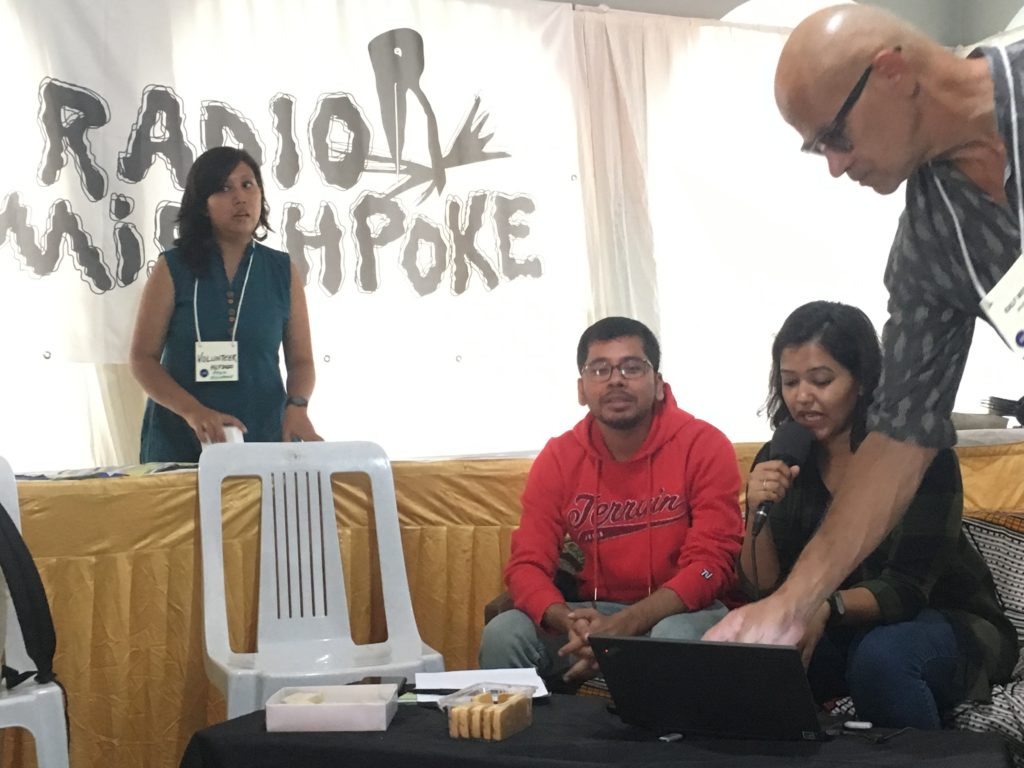
We talked about making radio art. The few days of Radio Mischpoke altogether with their processes, were full days of a kind of work in which we mostly facilitates access to expression from the topic to the technique. In the last few seconds of the live transmission, we gave a little noise and voice to the streets and it’s literature.
The street is loud and full of literature with Jasmina and Ralf
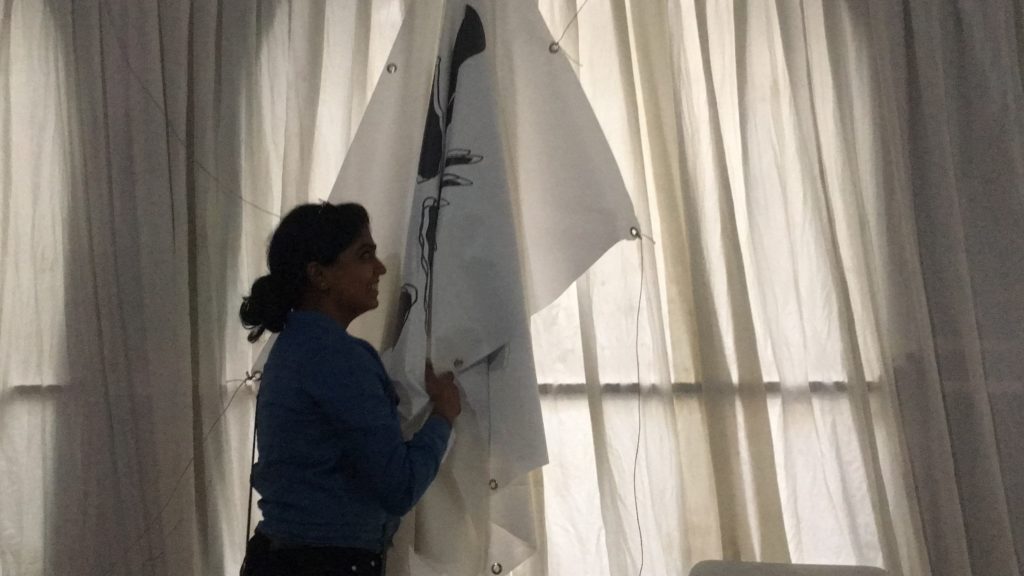
Radio Team:
Shruti Maithani, Ananya Baruah, Ananya Mukhopadhyay, Nimisha S Pradeep, N.S Nitish, Treesa Reena John, P Keerthi, Parveda Chandra Kiran, R Sri Rohith, Sowmya Reddy, Vaishalee Das.
Special thanks to: the fantastic audience that visited our couch.
Question from the audience: How are we picking our topics?

